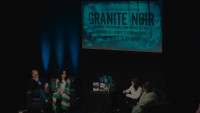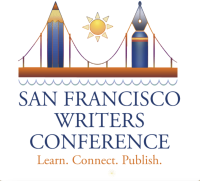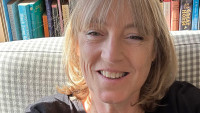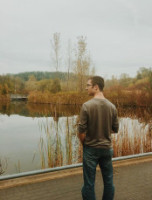
Aberdeen crime writing festival proves again why it’s the perfect match
creativescotland.com – Tuesday February 25, 2025

Aberdeen’s international crime writing festival came to a rapturous close on Sunday 23 February as the Fun Lovin’ Crime Writers brought down the curtain on Granite Noir 2025. The ninth edition saw over 80 authors, artists and speakers participate over the four day festival, including nine emerging North East writers as part of Granite Noir’s leading Locals in the Limelight series. Audiences travelled from across the country and tuned in around the world to enjoy events that dove into the thrilling world of crime fiction.
Criminal duos were in focus this year, with a live version of the hit BBC podcast Murder They Wrote with Laura Whitmore and Iain Stirling performed to a packed out Music Hall on Thursday night. And husband and wife writing teams Nicci French and Ambrose Parry discussed their process and real-life Partners in Crime.
Ben Torrie, Director of Programming and Creative Projects at Aberdeen Performing Arts remarked on this year’s event: “This year’s Granite Noir invited everyone to become our partners in crime, and we’re delighted that so many joined us as accomplices this past weekend. Reading and writing could be considered solitary occupations, but the acknowledgments at the end of any book prove it is anything but a solo endeavour. So too it is the case with this festival. Granite Noir would not be possible without the efforts of the team, our key funders and festival partners and I’d like to take the opportunity to thank all of them for their continued support. Most of all though, Granite Noir couldn’t happen without the support of our audiences and of the city of Aberdeen. As we look forward to our tenth edition next year, I’d like to express my gratitude to everyone who has embraced Granite Noir into the fabric of the city and established its place as one of Scotland’s leading literary events.”

Erin Murphy Literary Agents Join Aevitas
publishersweekly.com – Monday February 24, 2025

The agents of Windham, Maine–based children’s book agency Erin Murphy Literary Agency—including founder Erin Murphy and agents Tricia Lawrence, Kevin Lewis, Ammi-Joan Paquette, and Miranda Paul—have joined Aevitas Creative Management. The EMLA backlist will remain under the EMLA umbrella and Murphy's supervision, with business affairs personnel Susan Murrell and Dennis Stephens continuing to process payments and statements on titles sold before January 31, 2025. Murphy joins Aevitas as a partner, Lawrence and Paquette as senior agents, and Lewis and Paul as agents.
“When I began working on a succession plan last year, I spoke with many wonderful agencies whose people were generous with their time and information. I feel so fortunate to have found Aevitas, which ticks all the boxes for me,” said Murphy in a statement. “In addition to being able to immediately provide more support for five agents and more robust systems than we had at EMLA, ACM is full of warm people with esteemed lists, and adding EMLA’s authors and illustrators will increase the presence of ACM Kids & Illustration to the benefit of all. Joining ACM has been a joy, and I’m glad to be shifting roles to focus squarely on representing my clients again, while phasing out my role as agency head.”

New Publisher Listing: Pelagic
firstwriter.com – Saturday February 22, 2025

A leading independent publisher of books on ecology, wildlife and environmental science. We publish for academics, libraries and natural history enthusiasts, and are actively commissioning in subjects including: ecology, wildlife, conservation, research methods, data collection, data analysis, fieldwork, identification, taxonomy and phylogenetics, environmental science and technology in nature.

Eric Puchner: How to Be Funny When Writing a Novel
lithub.com – Saturday February 22, 2025

Is anything more embarrassing than trying to be funny and going splat? I sometimes think there’s an inverse relationship between trying to be funny and actual funniness. This is especially true in literature, I think. When you think of great comic novels and short stories—True Grit, Mrs. Bridge, On Beauty, anything by Joy Williams—you think, above all, of their effortlessness, how what’s funny about them is inextricable with their, well, novel-ness. They can’t fail to be funny, because they hardly seem to be trying to. They don’t strain after jokes so much as evoke the inherent funniness of life.
The philosopher Henri Bergson talks about “mechanical inelasticity”: something is funny when a person—or, I suppose, an animal—fails to adapt to a change in their surroundings. Think of the unsuspecting fellow who tries to sit down on a chair that’s been pulled out from under him. We expect someone to act a certain way, one that conforms elastically to the situation they’re in, and it’s funny when they don’t. As Simon Critchley puts it, in his book On Humor: there’s a disconnect between “expectation and actuality.”
This isn’t just a nifty, somewhat incontrovertible theory of humor. It’s a nifty, somewhat incontrovertible theory of what makes a novel or short story work. One might even say that a disconnect between expectation and actuality is the essential element of fiction. A young man wakes up as a beetle and yet worries more than anything about getting to work on time (“The Metamorphosis”); a wealthy couple insist on finishing their dinner at a country club, despite the fact that a tornado’s approaching and everyone else has fled to the basement (Mrs. Bridge). When my students complain about writer’s block, that they have no idea what to write about, I often encourage them to think of something funny that’s happened to them: not because I want their readers to laugh out loud—though there are far worse things a reader might do!—but because something that meets the criteria for funniness also meets the criteria for engaging fiction. The sound of laughter is the sound of a story succeeding.

‘Golden age’ of self-publishing for indie authors ‘no longer strictly choosing one route or the other’
thebookseller.com – Saturday February 22, 2025

There is something in the air in the self-publishing world at the moment; just ask the Alliance of Independent Authors’ (ALLi) co-founder and director Orna Ross, who has watched the sector develop over the past decade and a half. Though she still does not see traditional and self-publishing as “sitting together that much”, she believes “it’s a hugely exciting time to be an indie author”.
Former Harper Press managing director John Bond (pictured), turned CEO and co-founder of Whitefox – which launched in 2012, offering a “curated network of publishing specialists” to companies and individuals, many of whom are self-publishers – agrees.
He says: “There’s still a bit of a stigma around self-publishing, but it’s changed, because more people want to have creative control of their own books. They want to do things in a time frame that suits them, rather than hope that they will find an agent, and that the agent finds a publisher, and at some point, in the future, that book is published. New writers are saying: ‘I can do something relatively quickly and learn how to be an entrepreneurial, self-starting author.’”
This is what Monique Charlesworth, who founded Moth Books in order to publish her own (and now others’) books, wanted to do with its launch title, her book Mother Country: “I published four titles traditionally, and I worked with marvellous people, but they didn’t care like I did about the cover, about the quotes. They weren’t necessarily great at communication and publicity.”

2025 San Francisco Writers Conference Review
splashmags.com – Saturday February 22, 2025

The 21st Annual San Francisco Writers Conference (SFWC) was held at the Hyatt Regency San Francisco on the Embarcadero Waterfront, February 6 – 9, 2025. What started as a two-day conference in 2004, under the direction of Michael Larsen and Elizabeth Pomada, has expanded to four days with additional pre/post master classes, an exhibition hall, a free Teen Writers Summit and a Student Forum for university and college students.
The SFWC has become one of the premier writing events in the country. The 2025 conference theme was Learn, Connect, Publish. Whether you are interested in traditional publishing, self-publishing, or a hybrid publishing scenario, the theme reflects the founders’ vision of helping writers get their work published by increasing their skills and connecting them with publishers, editors, agents and other professionals.
Are you a writer? Do you wish you had a connection, to someone special in the writing or publishing world? SFWC presents a great opportunity for networking: meeting, listening, and talking with people who may become a connection for you in your writing journey.
Authors are often called upon to talk about themselves, or speak in an open forum. If you are not comfortable in the spotlight then SFWC can help. You’ll be motivated to push yourself, and get the most benefit from the conference.
I approached my time at the conference not only as a Splash journalist, but as a pre-published novelist wanting to learn how to submit my manuscript about The Life and Art of Julian Ritter, to a traditional publishing house. Here are my impressions and what I learned – hopefully this will help you.
Agents, editors, and authors all need the industry to succeed. Writers often love being holed up alone, spilling their thoughts onto paper. Just as often, they agonize over their words, ability, or direction. This conference is full of people who “get it.” You’ll have support to shed that thin skin, put your work and yourself out there, and take the lumps. Because those lumps will make you better, will present new possibilities, and perhaps, take you to the next level.

How to Write a Novel: A 7-Step Guide
snhu.edu – Wednesday February 19, 2025

Writing a novel is a process that begins with an idea, develops through outlining and creating compelling characters and grows with a consistent writing routine and revising.
If you want to become a novelist, your first book can feel like a daunting task. But, with the right approach, it can also be a manageable process. Whether you’re starting with a vivid idea or simply a desire to tell a story, breaking the process into clear steps can help you bring your vision to life.
1. Understanding What a Novel Actually Is
A novel is a long-form work of fiction, typically spanning 250–400 pages, according to Jeremy Flagg, a dystopian and sci-fi novelist with the books "Nighthawks" and "Night Shadows" to his credit. He’s also an adjunct faculty member in the online creative writing and English program at Southern New Hampshire University (SNHU).
“Whether exploring seemingly insignificant moments of life or diving deep into the essence of what it means to be human, novels allow writers to weave expansive narratives that capture the complexities of the human experience," he said.
2. Starting With an Idea
When it comes to writing a novel, authors find inspiration in different ways.
Ideas can come from the shows you love or mundane places, said Flagg, who’s often inspired by watching crowded spaces or TV. Once it takes shape, he said, it can be developed further by imagining unique situations and building the story around them.
Choosing a topic or theme you care about makes the process more enjoyable and authentic. Beginners should write about something they are passionate about, he said.

CPI and The Agency suffer cyber attacks as publisher profits 'hit significantly'
thebookseller.com – Wednesday February 19, 2025

The UK’s leading book printer, CPI, and The Agency have both been hit by ransomware attacks, The Bookseller understands.
Clients of CPI, including Welsh independent Firefly Press, have been majorly affected with some profits “wiped out”. The cyber attack on The Agency – a London-based literary agency – has been attributed to the Rhysida ransomware group, which previously targeted the British Library, and has allegedly threatened to publish stolen data if not paid a ransom. It is unknown whether the same ransomware group is responsible for the CPI attack.
A spokesperson for CPI told The Bookseller: “In the early hours of Friday, 7th February 2025, our IT systems were disabled, affecting the UK part of our business. After completing initial forensic analysis we were able to determine that we had encountered a cyber attack, despite having significant protection already in place across our entire network.
“As soon as the attack was identified, we engaged specialist external technical support, who along with our own teams have been working to recover our systems as quickly as possible. Our colleagues across the whole business have been working extraordinarily hard to develop workarounds as well as to reimplement our IT systems and have made substantial progress. We continue dialogue with our customers and other stakeholders to ensure that they are fully aware of the status. We expect to resume full services gradually over the coming days.”

New Literary Agent Listing: Jared Johnson
firstwriter.com – Friday February 14, 2025

I'm a recovering academic. After several years of academic research in the humanities and teaching writing and history, I realized academia wasn't for me, but I always loved sharing good stories with others. I wanted a job that would still let me do that, so I pursued a career in publishing. I represent a range of nonfiction and fiction genres.

A major book publisher announced a change. The industry freaked out.
vox.com – Tuesday February 11, 2025

For the past few months, publishing has been consumed with debate over that ever-divisive topic: blurbs, those breathless little testimonials from other writers that appear on the back of a book’s cover, which hardly anyone likes to write and even fewer people like to ask for.
One big author and one major publisher announced within weeks of each other that they were through with the practice of blurbs, and the resulting conversation threw publishing into a tizzy. In the process, it provided a new lens on who has access to clout and resources in an increasingly precarious industry.
Authors traditionally set out to procure blurbs after their books have been accepted by publishers and gone through the editorial process, but before the books have been finalized, typeset, and printed. At that point, some combination of author, editor, and publicist reaches out to other writers, ideally famous ones, and ask them to read the manuscript and write a few nice words to go on the back of the published book.
Get the free newsletter | Submit a news item or article | Get Writers' News for your website





